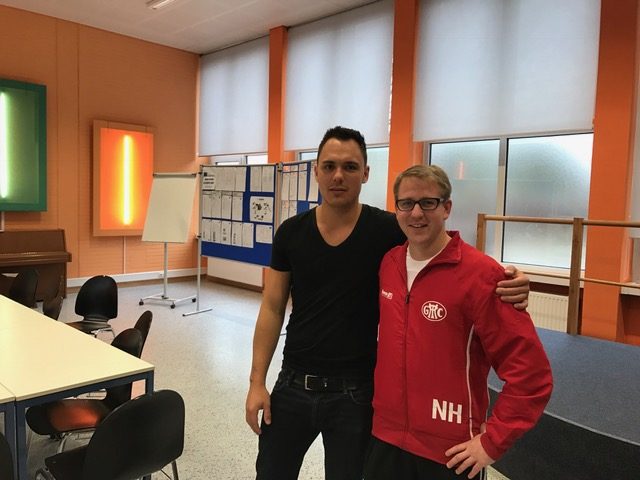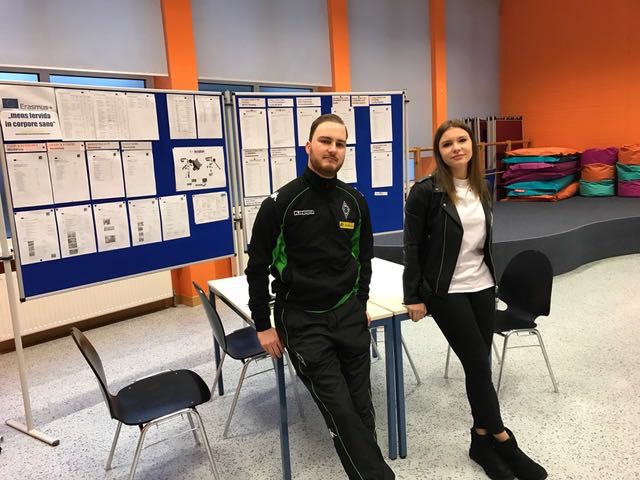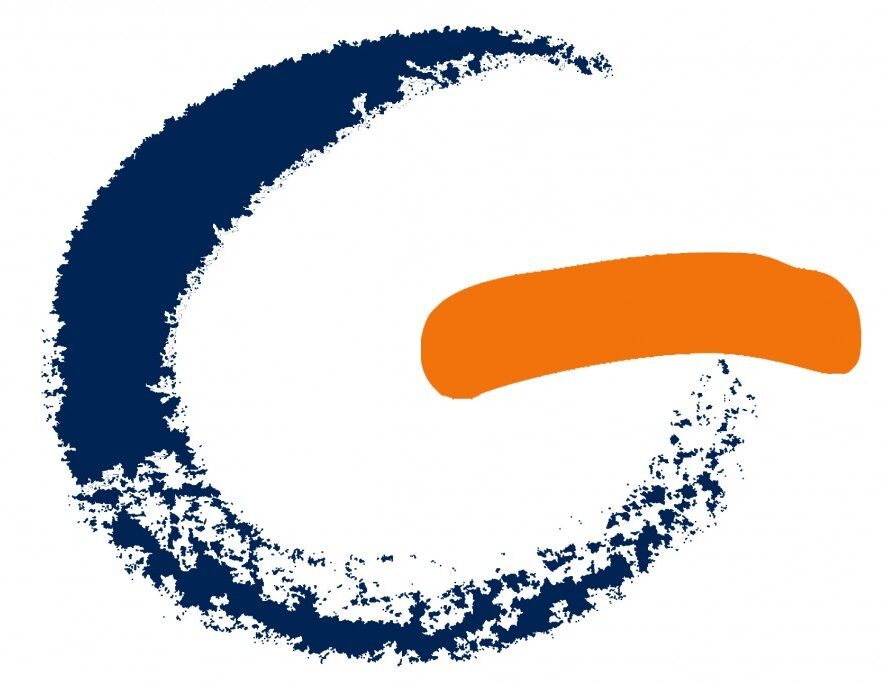Ernährung und Leistungssport – ein wichtiges Thema sowohl im Profi- als auch im Amateursportbereich. Teilnehmer des Erasmus+ Projektes haben Verantwortliche unserer Partner Borussia und GHTC interviewt.
Interview mit Nils Helbig (GHTC) Feldhockeytrainer im Profi- und Jugendbereich

Innerhalb des Erasmus + Projekts „Mens fervida in corpore santo“ setzen sich Jugendliche aus vier europäischen Nationen damit auseinander, was für eine gesunde Lebensweise wichtig ist und wie damit in Europa umgegangen wird. Im Mittelpunkt der Workshops liegt der Fokus auf Sport und Ernährung.
Um zu erfahren, wie sehr sich richtige und gesunde Ernährung auf den Körper und damit auch auf den Erfolg beim Sport auswirken, haben wir mit Experten von Borussia Mönchengladbach und dem GHTC (Gladbacher Hockey u. Tennis Club), jeweils Partner der Gesamtschule Hardt, gesprochen. Als professioneller Feldhockeytrainer im Profi- und Jugendbereich ist Nils Helbig (GHTC) täglich mit dem Thema Sport und Ernährung konfrontiert und stellte sich unseren Fragen in einem Interview.
Im Jugendbereich ist Nils neben seiner Hauptaufgabe als Trainer auch als Botschafter für den Hockeysport mit individuellen Angeboten an Schulen und Kindergärten unterwegs, um bereits Kinder so früh wie möglich für diesen Sport zu begeistern. Zusätzlich ist er als Trainer der Westdeutschen U13-Auswahlmannschaft im Leistungssportbereich tätig. Schon früh versuchen die Trainer Einfluss auf die jungen Sportler hinsichtlich der richtigen Ernährung zu nehmen, indem vor Spielen und Turnieren, aber auch im Training unter der Woche auf gesunde Ernährung hingewiesen wird. „Ob dies eingehalten wird, können wir leider nicht kontrollieren, daher versuchen wir frühzeitig auf die jungen Sportler hinsichtlich gesunder Ernährung einzuwirken, damit sie selber ein Bewusstsein für die richtige Ernährung entwickeln, um damit ihre Leistungen verbessern zu können“, erklärte uns Nils. Das Bewusstsein für gesunde Ernährung im Zusammenhang mit Sport ist in den letzten Jahren aber merklich gestiegen. „Als ich selber noch im Jugendbereich gespielt habe, hat niemand auf die richtige Ernährung geachtet, da sind wir generell vor großen Turnieren mit der Mannschaft zu einer Fast-Food Kette gegangen. Dies wird heute nicht mehr gemacht und man merkt eine deutliche Leistungssteigerung von früher zu heute.“ stellte Nils fest.
Doch nicht nur über den Bereich Sport und Ernährung konnten wir uns mit Nils austauschen, sondern auch über den zweiten Gedanken des Projekts; den europäischen Gedanken und Zusammenhalt. Auch der GHTC pflegt Kontakte zu internationalen Partnervereinen, z B. in Frankreich und in Schweden, mit denen auch Austauschprogramme zustande gekommen sind. Nils ist überzeugt, dass der ohnehin schon bedeutungsvolle Gedanke unseres Projektes in Zukunft noch wichtiger wird, da „jeder Verein über seinen Tellerrand hinausschauen möchte […] und dadurch richtige Ernährung und internationaler Zusammenarbeit immer an Bedeutung gewinnen werden.“
Interview und Text: Léon Michels (Q2)
Interview mit Melf Carstensen nutrition coordinator and ecotrophologist at the football club Borussia Mönchengladbach

Interview und Text: Elena Schriefers (Q2)
Melf Carstensen nutrition coordinator and ecotrophologist at the football club Borussia Mönchengladbach talks about the importance of nutrition and sport with Elena Schriefers, a teammember of the last Erasmus Project.
You are a nutrition scientist – could you please explain typical tasks in your job? Moreover, which skills are needed? And which fields of work does your job offer?
My job is very complex. It contains different tasks, for example science, purchase, economics and nutrition. At Borussia Mönchengladbach, I work as a nutrition scientist and as a food coordinator. Therefore, I have to respond to all the questions concerning nutrition. I am active in both parts, in the professional field and in the youth sector. These tasks are completely different. In the professional field, I have to create the professional setting, I have to accomplish the purchase, I have to talk to the guest team and I have to organise the training camp. In the secondary growth, I have to convey a base of theoretical knowledge about nutrition.
Why did you decide to study nutritional science and home economics?
After my civil service, I started to study nutritional science and home economics. I have always had an interest in nutrition and sports. Moreover, I was interested in how nutrition can influence your physical performance. In addition, I like to cook and I like to know which ingredients are contained in for example fruits and how important they are.
What kind of motivation did you have in the first place? Was it rather the interest in sports or nutrition?
I cannot really compare these task fields because I am interested in both. Nevertheless, I decided to head more for nutrition because this part has more possibilities in the future.
At the moment, you are working in a football club. How important is a proper nutrition for sport? And how important is the combination of sport and nutrition?
One of the most important things of sport is the competition and because of that the players have to achieve good results. Football develops in a more active way because the game is getting faster and more intense, the young players have to be prepared earlier for competitions and the professional section. Furthermore, the level of training is getting higher, the mental und athletic training develops and therefore the players have to keep their shape. To keep them fit, I have to take measures to make sure that the players get a professional nutrition. By treating your body right, the players can achieve better results and they can prevent injuries. Moreover, the right nutrition and nutrients at the right time can help the players to get fit easily and quickly after injuries.
Is it possible that the right nutrition can influence the physique so that there are less injured people for example?
Exactly. If people pay more attention to nutrition, they can see it in their outward appearance. But what is going on inside their body is not visible. Nevertheless, a lot of different processes are taking place inside, for example hormonal adjustments or the supply of your muscles. That’s why there is a prophylaxis of injuries.
Can everyone afford a healthy nutrition, even the people who only do sport as a hobby?
Of course, high-quality products are expensive but if the people deal with the subject “nutrition”, they can even find good products that are not so expensive, for example low-fat curd cheese and icebound berries.
But nutrition itself isn’t be enough for a healthy body, right? How important is sport in this place?
Sport is really important. By doing sport, people can create a stimulus that the body has to get used to. The body needs “building blocks“, because without them no process can take place in your body.
Do you think that sport and nutrition, particularly for young people, have the right importance?
The significance increases because if you take a closer look at the fitness centers, you can see a lot of young people who are more interested in sport. In the past, you could mainly see bodybuilders or old people doing sport. Nowadays, there is a wide range of people in the fitness centers. You will see many young people who are doing individual sport, have their own training plan and who are doing good exercises like squats. Besides, the young people also deal more with nutrition to keep the balance. But they have to be careful that they do not adopt a wrong lifestyle.
Do you think that your job will gain more importance in the future?
Yes of course. I think that in the future the job as a nutrition scientist will get more important, especially for the sport. But not only in the professional section (s.o.), even if you do sport as a hobby with a high level of training, nutrition scientists are important. Before I worked at Borussia, I worked with triathletes who also need a high-quality nutrition because of their professional training.
There are also fitness channels where you can get tips and information on that job but you have to be careful because the tasks of a nutrition scientist are very diverse.
